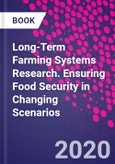Long-Term Farming Systems Research: Ensuring Food Security in Changing Scenarios presents the legacy and heritage of Long-Term Experiments (LTEs) in Agriculture while also addressing the challenges and potential solutions. The book discusses how LTEs form an important asset in understanding agriculture's significant influence on life on earth. As global governments and development agencies try to achieve the Global Sustainable Development Goals (SDGs) of the United Nations, this book's content is of unprecedented importance, providing insights into the interactions of agricultural production with ecological, economic and societal aspects.
In this regard, this book offers a thorough resource of information based on experiences from various ongoing LTEs in different parts of the world. The contextual variety and geographic diversity presented in this book makes it useful for agricultural and environmental scientists, as well as students and educators in such fields.
--:
From the Editors: "Thanks to the excellent panel of our contributing authors, in this book, we have attempted to offer the widest possible thematic and geographical coverage on LTEs. Experts from different institutions leading LTEs across the globe have provided their perspectives on different aspects of LTEs, not only highlighting the unique knowledge contribution of LTEs, but also discussing the unique challenges of effectively managing LTEs and maintaining their relevance to changing scenarios. We hope that this book will offer something for everyone interested in the history, present and future of our agroecosystem."
Please Note: This is an On Demand product, delivery may take up to 11 working days after payment has been received.
Table of Contents
I. From the Editors' Desk
- Preface Long-term experiments in agriculture: Stages, challenges and precautions
II. Lessons for Agricultural Development
1. Long-term agricultural research at Rothamsted 2. Implementation and management of the DOK long-term system comparison trial 3. Pursuing agroecosystem resilience in a long-term Mediterranean agricultural experiment 4. Challenges of maintaining relevance to current agricultural issues in a long-term cropping establishment experiment in Canterbury, New Zealand 5. Integration of efficient farm enterprises for livelihood security of small farmers
III. Maximizing Outcomes Through Networking and Capacity Development
6. Building capacity from Glenlea, Canada's oldest organic rotation study 7. Testing long-term impact of agriculture on soil and environment in Poland 8. Geographical network: Legacy of the Soviet era long-term field experiments in Russian agriculture 9. Managing long-term experiment data: A repository for soil and agricultural research 10. Long-term experiments on agroecology and organic farming: The Italian LTE network








